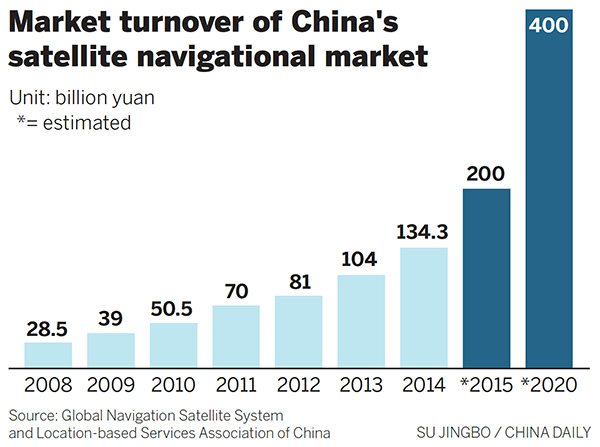
In fact, there is hardly an online sector that has not been affected by the eye in the sky network.
Apart from taxi-hailing mobile apps, an array of booking services have sprouted up on smartphones ranging from restaurant reservations to film tickets.
All need real-time location information, which is supplied by Beidou, or other satellite services.
Even so, the biggest potential customers online could be companies such as Didi Kuaidi, a local car-hailing platform, and rival Uber Technologies Inc in the US.
Didi Kuaidi is linked to the GPS mapping and location services operated by its backer Tencent Holdings Ltd, which is one of the big three online players in China. Uber uses its investor Baidu Inc's technology.
While the government is asking all smartphones manufacturers to install GPS systems that are compatible with Beidou, many still lack that function. But, again, that is changing.
"Our devices are using Beidou because the company embraces good-quality services that can lift customer experience," Lei Jun, CEO at Xiaomi Corp, one of the largest electronics companies in the country, said.
About 10 million Xiaomi smartphones, equipped with Beidou chips, are sold each quarter in China, proving the commercial eye in the sky has excellent vision.
Chip company to cash in on country's GPS-like navigational system
Peter Zhou and his firm Xi'an HuaXun Microelectronics Inc were going through a tough time in the summer of 2009.
The chip company in Xi'an, Shaanxi province, was struggling after he returned from the United States with a doctorate degree.
"We had no idea how we could make a profit competing against overseas companies that dominated the market," Zhou, founder and chairman of the firm, said. "It was the most difficult time in my working life, and I feared the company would not survive the winter."
The problem was HuaXun designed chips used in navigational devices that were only compatible with the US Global Positioning System or GPS.
Since 80 percent of the chips sold in China were made overseas, the company was on the verge of going under in the face of fierce competition.
With a last throw of the dice, Zhou decided to switch the firm's focus into building chips that operated the Beidou GPS system.
